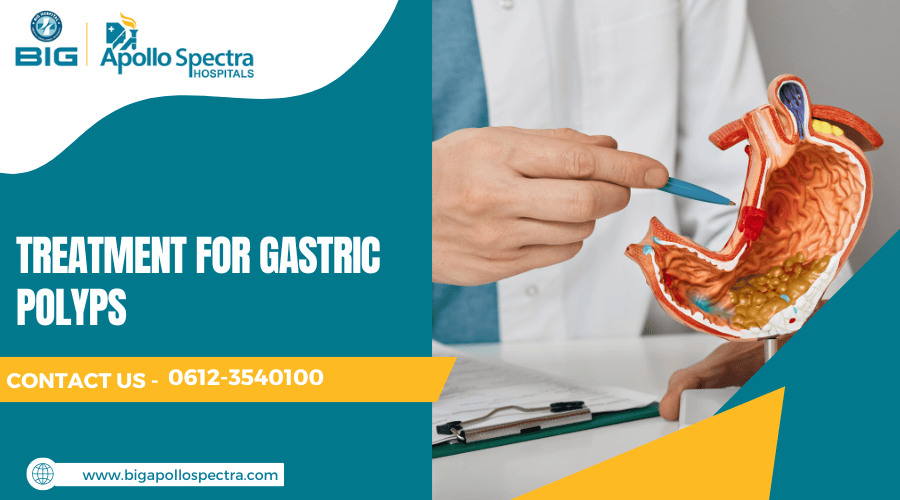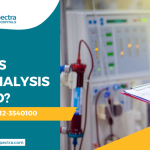Gastric polyps are atypical growths that shape at the lining of the stomach.
Should Gastric Polyps Be Removed? While most gastric polyps are benign and don’t cause signs and symptoms, some may additionally moreover furthermore emerge as cancerous or bring about different headaches.
Understanding the different types, motives, and remedy alternatives for gastric polyps is important in coping with this example effectively.
Big Apollo Spectra Hospital offers best stomach specialist in Patna making it a top choice for those searching out professional analysis and treatment.
What Are Gastric Polyps?
Belly polyps, also called gastric polyps, are tiny masses or growths that develop on the inner surface of the stomach.
These polyps are often found during routine endoscopies performed for reasons unrelated to them.
While gastric polyps are normally innocent, certain kinds can supply a danger of developing into stomach maximum cancers, making early detection and appropriate treatment crucial.
Types of Gastric Polyps
There are numerous sorts of gastric polyps, every with its non-public traits and dangers:
#1. Hyperplastic Polyps:
These are the maximum commonplace form of gastric polyps and are generally benign. However, in unusual instances, they may result in maximum cancers, particularly if they’ll be huge than 1 cm.
#2. Fundic Gland Polyps:
Typically located in people taking proton pump inhibitors (PPIs) for a long length, the ones polyps not often become cancerous but are monitored cautiously if they are huge.
#3. Adenomatous Polyps:
While less common, these polyps are significantly more likely to become Cancerous Gastric Polyps. Adenomas are seen as precancerous, indicating they have the potential to develop into stomach cancer if not addressed.
#4. Inflammatory Fibroid Polyps:
These are rare and non-cancerous growths often linked to long-term inflammation of the stomach’s inner lining.
Symptoms of Gastric Polyps
Are Polyps in The Stomach Serious? Gastric polyps frequently do no longer reason large signs and symptoms and are frequently detected sooner or later of endoscopy for unrelated gastrointestinal troubles.
However, if signs do get up, they may encompass:
- Abdominal pain or pain
- Bloating
- Nausea
- Vomiting
- Bleeding, that can motive anemia
- Dark, sticky stools (indicating gastrointestinal bleeding)
Seek Liver Specialist in Patna advice if you experience those signs and symptoms, as they could indicate gastric polyps or other gastrointestinal conditions.
Causes and Risk Factors of Gastric Polyps
The exact cause of gastric polyps is often uncertain; however, several factors can increase the likelihood of their development:
- Chronic Gastritis: Irritation of the lining of the stomach can lead to the development of growths, specifically hyperplastic growths.
- Helicobacter pylori (H. Pylori) Infection: This common bacterial infection is a recognized risk factor for stomach inflammation and the development of specific types of polyps.
- Long-term Use of Proton Pump Inhibitors (PPIs): Extended use of Proton Pump Inhibitors (PPIs) for treating acid reflux or ulcers can lead to the development of fundic gland polyps.
- Age: Gastric polyps are more common in individuals aged fifty and older.
Having familial adenomatous polyposis (FAP) raises the risk of developing adenomatous polyps.
Diagnosis of Gastric Polyps
Pictures Of Stomach Polyps are usually diagnosed during an upper endoscopy procedure, in which a small tube with a camera is inserted through the mouth into the stomach.
During this way, a Gastrology Doctor in Patna may additionally apprehend polyps and, if critical, take a biopsy to study the tissue below a microscope.
The type, length, and style of polyps decide the right treatment approach.
How Do You Treat Gastritis Polyps?
The management of gastric polyps depends on the type, size, and likelihood of cancer. Here are the most commonplace Treatment Options for Gastric Polyps:
#1. Observation and Monitoring
For smaller polyps that do not pose a excessive risk of becoming cancerous, medical clinical doctors may additionally propose ordinary monitoring.
In this example, the affected person undergoes periodic endoscopies to make certain that the polyps do not make bigger or trade in nature.
This is particularly actual for small hyperplastic or fundic gland polyps.
#2. Polypectomy
A polypectomy is a way wherein the polyps are eliminated inside the route of an endoscopy.
It is the maximum commonplace remedy for gastric polyps, mainly the ones which might be massive or considered precancerous. During a polypectomy, a twine loop or snare is used to lessen off the polyp, it is then removed from the belly.
Polypectomy is a minimally invasive device, typically achieved beneath sedation. The extracted polyp is sent for biopsy to determine if it is benign or malignant.
#3. Treatment of H. Pylori Infection
What Is Good for Stomach Polyps? If gastric polyps are associated with an H. Pylori contamination, treating the infection is an important step in dealing with the situation.
The remedy normally includes a combination of antibiotics to take away the micro organism, at the issue of acid-suppressing medicinal tablets like proton pump inhibitors (PPIs) to heal the belly lining.
Once the infection is cleared, the risk of Stomach Polyp Removal Side Effects might also additionally lower, and modern polyps may additionally moreover decrease or disappear.
#4. Surgical Intervention
In uncommon instances, surgical elimination of a part of the stomach (partial gastrectomy) may be crucial if polyps are severe or have a excessive risk of becoming cancerous.
Surgery is usually reserved for polyps that cannot be correctly removed endoscopically or those related to genetic syndromes that increase the hazard of maximum cancers.
#5. Management of Underlying Conditions
Addressing underlying conditions, including continual gastritis, is a key part of handling gastric polyps.
Medications to lessen stomach acid, cope with infections, or manage contamination can assist prevent the formation of recent polyps or lessen the scale of present-day ones.
Preventing Gastric Polyps
While it is able to not be possible to honestly prevent gastric polyps, high-quality manner of life adjustments can help reduce the hazard:
- Healthy Diet: A weight loss program rich in culmination, veggies, and complete grains can sell stomach health and reduce infection.
- Avoid Long-term Use of PPIs: Use proton pump inhibitors best as prescribed via your doctor, and avoid lengthy-term use with out scientific supervision.
- Manage H. Pylori Infections: If you are identified with an H. Pylori infection, ensure that it’s treatment to lower the threat of growing polyps.
- Regular Check-ups: Especially if you have a family records of gastric most cancers or polyps, ordinary medical endoscopies can assist in early detection and prevention.
Why Big Apollo Spectra Hospital?
When it involves the evaluation and remedy of gastric polyps, selecting the right Gastrology Hospital in Patna is essential.
Big Apollo Spectra Hospital in Patna best gastrology hospital in the area, presenting contemporary diagnostic treatments for a large form of gastrointestinal situations.
Their Gastroenterology doctor in Patna guarantees that sufferers accumulate customized care, from correct prognosis to effective treatment plans, which incorporates endoscopic techniques and surgical interventions if wanted.
While gastric polyps are frequent early
detection and appropriate remedy are key to stopping capability complications together with belly maximum cancers.
Treatment alternatives variety from clean tracking to polypectomy and, in uncommon times, surgical treatment.
If you are experiencing signs and symptoms or are susceptible to gastric polyps, consulting with an Gastrology specialist near me is vital.
Big Apollo Spectra Hospital in Patna is a relied-on leader in gastrology care, offering top-notch services for the control of gastric polyps and precise gastrointestinal situations.





